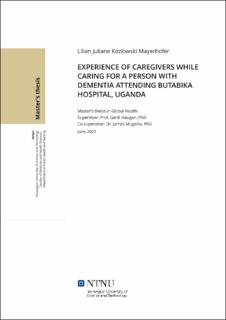| dc.description.abstract | Background: The experience of falling ill can many times be challenging not just to the person directly affected by the disease, but also to those involved in the process, for example, relatives, caregivers, and other people living with this person. Caregivers will most likely experience social restrictions, financial strain, and emotional distress. Objective: This project aims to understand the experience of taking care of elders living with dementia at Butabika National Referral Hospital, outpatient clinic in Kampala, Uganda.
Methods: This was a qualitative descriptive study. Fifteen caregivers of a person with dementia (PwD) were purposively sampled from the outpatient department of Butabika Hospital, Uganda. Following informed consent, each caregiver engaged in an interview guided by a semi-structured interview guide to obtain information on their experience in caring for an individual with dementia. The information gathered was then organized and analyzed through a qualitative content analysis framework inspired by Graneheim and Lundman (1).
Results: The analysis of the data gathered led to the establishment of the main theme “It’s my responsibility”. The main theme came as a result of a comprehensive understanding of eight different categories that were summarized and reflected upon by the author and two senior researchers. The categories were labeled as knowledge about the disease, financial constraints, personal care, inappropriate behavior, safety of the PwD, psychological distress, positive aspects, and coping. These categories allow understanding the pathway followed by caregivers while fulfilling their caregiving role, describing the challenges, positive aspects and coping strategies developed by caregivers. This works also unravels the needs stated by caregivers and possible areas for intervention by the government, health policy makers and health care professionals.
Conclusion: The experience of providing care for a PwD is vast and associated with a constellation of challenges that are deepened by social factors and welfare constraints in a low-income setting. Still, the experience of caregiving for a PwD also enables for positive experiences and the development of problem and emotion-focused coping strategies. However, more studies are required to better understand the experience of caregiving in low-income settings such as Uganda.
Keywords: Experience, Coping, Caregiver, Dementia, Uganda | |
